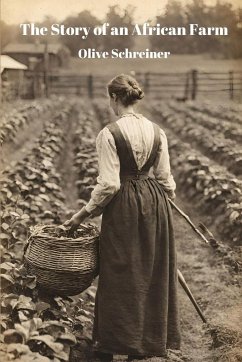"The Story of an African Farm" by Olive Schreiner is a literary masterpiece that beckons readers into the vast and untamed landscapes of 19th-century South Africa. This groundbreaking novel, published in 1883, stands as a beacon of literary innovation, weaving together a tapestry of rich storytelling, profound philosophical exploration, and a fearless challenge to societal norms. Set against the backdrop of the harsh and rugged South African frontier, the novel invites readers to embark on a journey into a world where the earth itself seems to pulse with life. Schreiner's vivid descriptions transport the reader to the heart of the African farm, a place where the land's beauty and brutality mirror the complexities of the characters' lives. At the heart of the narrative is the enigmatic character of Lyndall, a woman ahead of her time, whose quest for independence, intellectual curiosity, and defiance of traditional gender roles form the pulsating core of the story. Through Lyndall's eyes, readers witness a profound exploration of identity, autonomy, and the struggle for self-discovery in a society bound by rigid expectations. The narrative unfolds with a captivating non-linear structure, revealing the characters' lives in fragments that piece together like a mosaic. Schreiner's narrative style, infused with elements of naturalism and realism, captures the raw essence of the African landscape and the harsh realities faced by the novel's inhabitants. Each page is a brushstroke on the canvas of a world where existential questions about life, love, and the nature of existence reverberate. "The Story of an African Farm" is not merely a novel; it is an immersive experience that transcends time and space. The characters, from the introspective Waldo to the resilient Em, come alive with a vibrancy that resonates with readers. The novel's exploration of spirituality, morality, and the impact of colonialism elevates it to the realm of philosophical literature, prompting readers to reflect on the deeper layers of the human experience. Schreiner's groundbreaking work extends beyond its narrative brilliance; it serves as a pioneering voice in the feminist canon. Lyndall's unwavering spirit and resistance to societal constraints position her as an emblem of female empowerment, challenging the norms of a society steeped in patriarchal traditions. As readers turn the pages of "The Story of an African Farm," they are transported not only to a distant time and place but also into the recesses of their own consciousness. Olive Schreiner's prose is a symphony of words that captivates, challenges, and lingers in the minds of those who embark on this literary odyssey. It is a testament to the power of storytelling, the resilience of the human spirit, and the enduring relevance of a work that continues to shape the literary landscape and ignite the flames of introspection in the hearts of readers across generations.
Bitte wählen Sie Ihr Anliegen aus.
Rechnungen
Retourenschein anfordern
Bestellstatus
Storno









